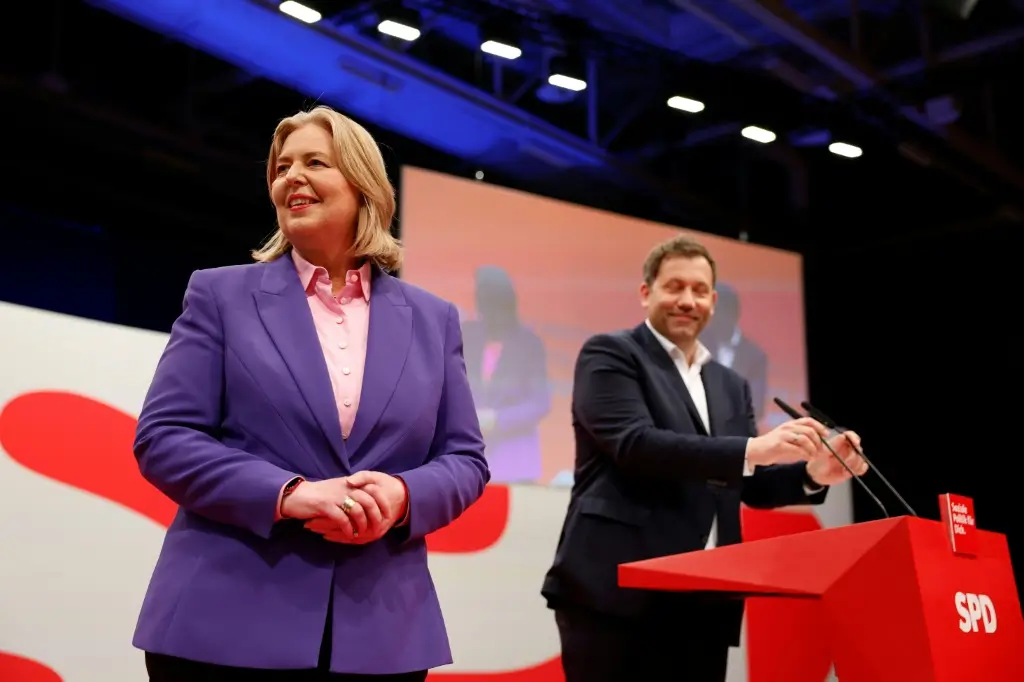
Four months after its historically poor performance in the federal election, the SPD has re-elected its party leadership. Delegates to the federal party conference in Berlin on Friday elected Federal Labor Minister Bärbel Bas as the new co-chairwoman with a dream result of 95 percent, alongside Vice Chancellor Lars Klingbeil. Klingbeil was severely punished, receiving only 64.9 percent.
There were no rival candidates to Bas and Klingbeil. Former Bundestag President Bas replaces the former co-chair Saskia Esken, who withdrew from the party after receiving some harsh criticism of her work following her election defeat.
Klingbeil became party leader at the end of 2021 at the start of the coalition government. Two years ago, he received 85.6% of the vote when he was first re-elected. Klingbeil now spoke of a “difficult result” that he would have wished for differently.
He naturally bears responsibility for the SPD's historically poor result of 16.4 percent in the federal election, the Federal Finance Minister said before his re-election. He added that the SPD reacted "far too late" to the deteriorating economic situation during the traffic light coalition. However, after the election defeat, he decided to continue in order to keep the party operational and "to be able to negotiate a government on equal terms with Friedrich Merz." Now he wants to do everything he can "to ensure that our party becomes strong again."
There was hardly any open criticism of Klingbeil during the first day of the party conference, after some SPD representatives had expressed incomprehension beforehand about his temporary assumption of the party's leadership immediately after the federal election, as well as his parliamentary group leadership, and his initial failure to intervene when his co-chair, Esken, came under fire after the election. Klingbeil now emphasized that the criticism against her had "often gone beyond what was justified."
Bas was more explicit. Esken had experienced that "solidarity is not always a given" within the party, she said. In general, the SPD's treatment of women at the top has "not been a shining example" so far.
In her candidacy speech, Bas focused on the demand for a society based on solidarity and decent jobs. She sharply criticized attempts to make the term "welfare state" a swear word and the talk of supposedly lazy Germans. This, she said, was "shameless kicking down the barrel." In terms of economic policy, she called for the preservation of industrial jobs in Germany. This also requires "a national steel summit" and "a strong industrial policy."
Bas also advocated accepting the compromise announced on Friday to increase the minimum wage, even though it would not achieve the €15 demanded by the SPD starting next year. The two-step increase to €14.60 in 2027 is, after all, "the largest wage increase agreed upon by the social partners since the introduction of the minimum wage," she emphasized.
The new Secretary General, Tim Klüssendorf, was elected with a strong result. The 33-year-old from Lübeck, like Bas, belongs to the left wing of the party and received 90.76 percent. Klüssendorf called the February federal election result "dramatic," but looked ahead: "We are starting our return here and now."
A key motion from the party executive committee was unanimously adopted at the party conference, which is intended to pave the way for the party's reorganization. The text, entitled "Change Begins With Us," announces a comprehensive analysis of the election defeat. The conclusions will then be drawn through a new policy platform in 2027.
The debate was criticized for the hardline stance taken by the CDU/SPD federal government on migration policy, such as the suspension of family reunification decided on Friday. The course of foreign and defense policy was also a central point of contention.
For a good two weeks, a foreign policy "manifesto" initiated by left-wing figures like Ralf Stegner has been causing a stir in the SPD. The approximately 100 signatories criticize "military alarm rhetoric" and propose talks with Russia to end the war in Ukraine.
German Defense Minister Boris Pistorius vigorously contradicted the manifesto authors at the party conference: "This imperialist in the Kremlin doesn't want to negotiate, he doesn't want peace," he said. Therefore, the position of the manifesto authors was "partly a denial of reality."